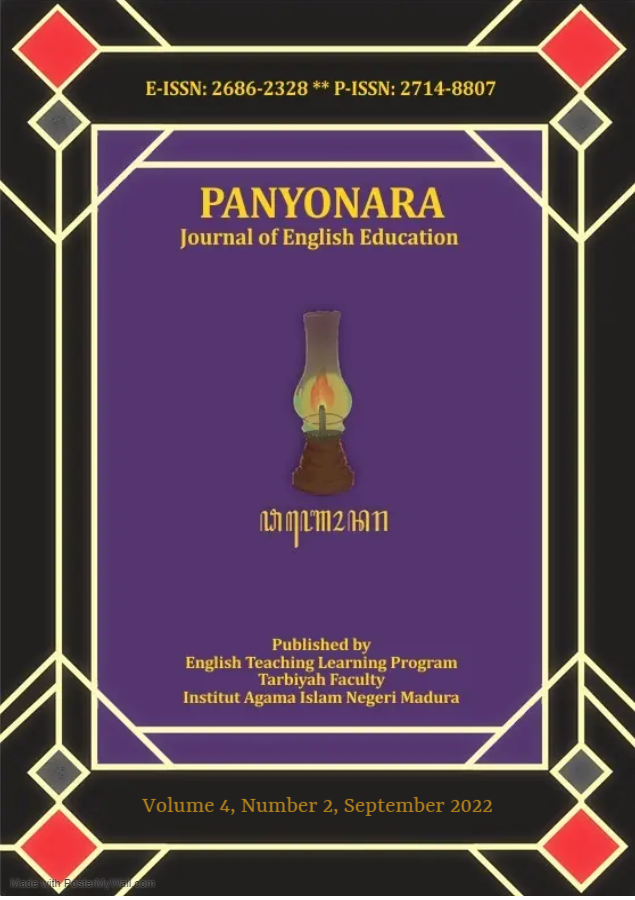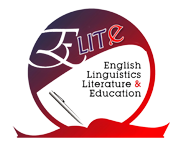The Usage of Online Assessment Moodle LMS and Google Classroom Environment for English Language Teaching
 Abstract views: 599
,
Abstract views: 599
,
 PDF downloads: 514
PDF downloads: 514
Abstract
Moodle and Google Classroom learning management systems (LMSs) generally operate in higher education and are accommodating when shifting from traditional face-to-face instruction to online courses. The study aims to examine and analyze online assessment or testing in Moodle and Google Classroom for English language learning. The study concentrated on the mixed method and the convergent parallel design. This research reveals methods to construct, adapt, and evaluate online assessments or testing in Moodle or Google Classroom. Moodle scores higher than Google Classroom in the Automated evaluation and Submission for Items evaluation aspect. On the other hand, Discussions on the Platforms and Share and Publication have a better experience with Google Classroom educators. English language lecturers or instructors exposed that Moodle comprehended Item Mean scores of 2.43, 2.42, and 2.41. it exposed those quizzes are the most common automated evaluation. Interactive multimedia applications may also be practical for online learning and assessment. However, the mean scores of 2.09, 2.16, and 2.18 revealed that comes to online learning, Moodle instructors who consider it an inadequate Google Classroom are out of touch with reality. Moodle and Google classroom scored low for the teacher aspect as implementation differences, and the finding elaborates on the opportunities and challenges of online assessment and testing. The participants noticed increased English language learners’ accomplishments and improved English lecturers’ online technical abilities. These results support the transition toward the future introduction of more online English language online courses
Downloads
References
Abdula, A. I., Baluta, H. A., Kozachenko, N. P., & Kassim, D. A. (2020). Peculiarities of Using of the Moodle Test Tools in Philosophy Teaching (pp. 306–320). [б. в.]. https://doi.org/10.31812/123456789/3867
Almossa, S. Y. (2021). University Students’ Perspectives Toward Learning and Assessment During Covid-19. Education and Information Technologies, 26(6), 7163–7181. https://doi.org/10.1007/s10639-021-10554-8
Almusharraf, N., & Khahro, S. (2020). Students Satisfaction with Online Learning Experiences During the Covid-19 Pandemic. International Journal of Emerging Technologies in Learning (IJET), 15(21), 246–267. https://doi.org/10.3991/ijet.v15i21.15647
Alqahtani, A. (2019). Usability Testing of Google Cloud Applications: Students’ Perspective. Journal of Technology and Science Education, 9(3), 326–339.
Alrehily, A. D., Siddiqui, M. A., & Buhari, S. M. (2018). Intelligent Electronic Assessment for Subjective Exams. ACSIT, ICITE, SIPM, 47–63. https://doi.org/10.3926/jotse.585
Alruwais, N., Wills, G., & Wald, M. (2018). Advantages and Challenges of Using E-Assessment. International Journal of Information and Education Technology, 8(1), 34–37. https://doi.org/10.18178/ijiet.2018.8.1.1008
Alyahya, D., & Almutairi, N. (2019). The Impact of Electronic Tests on Students’ Performance Assessment. International Education Studies, 12(5), 109–119. https://doi.org/10.5539/ies.v12n5p109
Barman, B., & Karthikeyan, J. (2019). Facilitating ELT Through Moodle and Google Classroom. Restaurant Business, 118(10), 506–518. https://doi.org/10.26643/rb.v118i10.9570
Böhmer, C., Feldmann, N., & Ibsen, M. (2018). E-Exams in Engineering Education—Online Testing of Engineering Competencies: Experiences and Lessons Learned. 2018 IEEE Global Engineering Education Conference (EDUCON), 571–576. https://doi.org/10.1109/educon.2018.8363281
Boyko, M., Turko, O., Dluhopolskyi, O., & Henseruk, H. (2021). The Quality of Training Future Teachers During the COVID-19 Pandemic: A Case from TNPU. Education Sciences, 11(11), 660. https://doi.org/10.3390/educsci11110660
Buhu, A., & Buhu, L. (2018). A Proposal for a Mixed Assessment of Students on Facilities Offered by Google and Moodle. The 14th International Scientific Conference ELearning and Software for Education, 148–153. Bucharest.
Chen, B., Bastedo, K., & Howard, W. (2018). Exploring Design Elements for Online STEM Courses: Active Learning, Engagement & Assessment Design. Online Learning, 22(2), 59–75. https://doi.org/10.21125/edulearn.2017.0728
Chicioreanu, T. D., & Cosma, L. (2017). I am a Teacher in the Digital Era. What to Choose: Google Classroom or Moodle? The International Scientific Conference ELearning and Software for Education, 310–315. Bucharest.
Cristiano, K. L., & Triana, D. A. (2019). Google Classroom as a Tool-Mediated for Learning. Journal of Physics: Conference Series, 1161(1), 012020. https://doi.org/10.1088/1742-6596/1161/1/012020
Csapó, B., & Molnár, G. (2019). Online Diagnostic Assessment in Support of Personalized Teaching and Learning: The Edia System. Frontiers in Psychology, 10, 1522. https://doi.org/10.3389/fpsyg.2019.01522
Dahal, N. (2019). Online Assessment through Moodle Platform in Higher Education. ICT in Education Conference. Hotel Yellow Pagoda, Kathmandu.
Dascalu, M.-D., Dascalu, M., Ruseti, S., Carabas, M., Trausan-Matu, S., & McNamara, D. S. (2020). Cohesion Network Analysis: Predicting Course Grades and Generating Sociograms for a Romanian Moodle Course. International Conference on Intelligent Tutoring Systems, 174–183. https://doi.org/10.1007/978-3-030-49663-0_21
Desai, V. P., Oza, K. S., & Kamat, R. K. (2021). Preference Based E-Learning During Covid-19 Lockdown: An Exploration. The Online Journal of Distance Education and E-Learning, 9(2).
Dhawale, K. R., & Tikar, K. D. (2019). Insights Of Moodle Usages in the Teaching-Learning Methodologies. Think India Journal, 22(14), 13041–13047.
Doğan, N., Uysal, N. K., Kelecioğlu, H., & Hambleton, R. K. (2020). An Overview of E-Assessment. Hacettepe Üniversitesi Eğitim Fakültesi Dergisi, 35(Special Issue), 1–5. https://doi.org/10.16986/huje.2020063669
Elzainy, A., el Sadik, A., & al Abdulmonem, W. (2020). Experience of E-Learning and Online Assessment During the COVID-19 Pandemic at the College of Medicine, Qassim University. Journal of Taibah University Medical Sciences, 15(6), 456–462. https://doi.org/10.1016/j.jtumed.2020.09.005
Gamage, S. H. P. W., Ayres, J. R., & Behrend, M. B. (2022). A Systematic Review on Trends in Using Moodle for Teaching and Learning. International Journal of STEM Education, 9(1), 1–24. https://doi.org/10.1186/s40594-021-00323-x
García-Peñalvo, F. J., Corell, A., Abella-García, V., & Grande-de-Prado, M. (2021). Recommendations for Mandatory Online Assessment in Higher Education During the COVID-19 Pandemic. In Radical solutions for education in a crisis context (pp. 85–98). Springer. https://doi.org/10.1007/978-981-15-7869-4_6
Haas, M., Scheibe, S., el Khawli, E., Künzi, M., Ihle, A., Ballhausen, N., Framorando, D., Kliegel, M., & Zuber, S. (2021). Online Assessment of Cognitive Functioning Across the Adult Lifespan Using the eCOGTEL: A Reliable Alternative to Laboratory Testing. European Journal of Ageing, 1–11. https://doi.org/10.1007/s10433-021-00667-x
Hidayat, M. L., Prasetiyo, W. H., & Wantoro, J. (2019). Pre-Service Student Teachers’ Perception of Using Google Classroom in a Blended Course. Humanities & Social Sciences Reviews, 7(2), 363–368.
Hüseyin, Ö. Z., & Özturan, T. (2018). Computer-Based and Paper-Based Testing: Does the Test Administration Mode Influence the Reliability and Validity of Achievement Tests? Journal of Language and Linguistic Studies, 14(1), 67–85. https://doi.org/10.18510/hssr.2019.7242
Jubaedah, Y., Yulia, C., Muktiarni, M., & Maosul, A. (2020). Usability Testing Electronic Rubric of Performance Assessment. Journal of Physics: Conference Series, 1456(1), 012016. https://doi.org/10.1088/1742-6596/1456/1/012016
Juhaňák, L., Zounek, J., & Rohlíková, L. (2019). Using Process Mining to Analyze Students’ Quiz-Taking Behavior Patterns in a Learning Management System. Computers in Human Behavior, 92, 496–506. https://doi.org/10.1016/j.chb.2017.12.015
Khlaisang, J., & Koraneekij, P. (2019). Open Online Assessment Management System Platform and Instrument to Enhance the Information, Media, and ICT Literacy Skills of 21st Century Learners. International Journal of Emerging Technologies in Learning, 14(7). https://doi.org/10.3991/ijet.v14i07.9953
Kumar, J. A., Bervell, B., & Osman, S. (2020). Google Classroom: Insights from Malaysian Higher Education Students’ and Instructors’ Experiences. Education and Information Technologies, 25(5), 4175–4195. https://doi.org/10.1007/s10639-020-10163-x
Mahmud, M. M., & Wong, S. F. (2018). Facebook and Collaborative Learning: An Empirical Study on Online Assessment. International Journal of Learning and Teaching, 4(2), 107–113. https://doi.org/10.18178/ijlt.4.2.107-113
Murtikusuma, R. P., Fatahillah, A., Hussen, S., Prasetyo, R. R., & Alfarisi, M. A. (2019). Development of Blended Learning Based on Google Classroom with Using Culture Theme in Mathematics Learning. Journal of Physics: Conference Series, 1165(1), 012017. https://doi.org/10.1088/1742-6596/1165/1/012017
Nguyen, J. G., Keuseman, K. J., & Humston, J. J. (2020). Minimize Online Cheating for Online Assessments During COVID-19 Pandemic. Journal of Chemical Education, 97(9), 3429–3435. https://doi.org/10.1021/acs.jchemed.0c00790
Okada, A., Whitelock, D., Holmes, W., & Edwards, C. (2019). E‐Authentication for Online Assessment: A Mixed‐Method Study. British Journal of Educational Technology, 50(2), 861–875. https://doi.org/10.1111/bjet.12608
Okmawati, M. (2020). The Use of Google Classroom During Pandemic. Journal of English Language Teaching, 9(2), 438–443. https://doi.org/10.24036/jelt.v9i2.109293
Padayachee, P., Wagner-Welsh, S., & Johannes, H. (2018). Online Assessment in Moodle: A Framework For Supporting Our Students. South African Journal of Higher Education, 32(5), 211–235. https://doi.org/10.20853/32-5-2599
Popovic, N., Popovic, T., Rovcanin Dragovic, I., & Cmiljanic, O. (2018). A Moodle-Based Blended Learning Solution for Physiology Education in Montenegro: A Case Study. Advances in Physiology Education, 42(1), 111–117. https://doi.org/10.1152/advan.00155.2017
Rane, V., & MacKenzie, C. A. (2020). Evaluating Students with Online Testing Modules in Engineering Economics: A Comparision of Student Performance with Online Testing and with Traditional Assessments. The Engineering Economist, 65(3), 213–235. https://doi.org/10.1080/0013791x.2020.1784336
Rohman, M., Wiyono, A., & Baskoro, F. (2021). Combination of Moodle Online Learning Application (Vilearning UNESA) and Google Classroom to Improve the Quality of Online Learning. 2021 Fourth International Conference on Vocational Education and Electrical Engineering (ICVEE), 1–6. https://doi.org/10.1109/icvee54186.2021.9649744
Salman, S. A. (2019). The Effect of Smartphone Testing and Computerized Testing on Third Grade Students Biology’Acceleration in Teaching Methods of Science and Teaching Techniques. Opción: Revista de Ciencias Humanas y Sociales, 89, 194.
Sando, K., Medina, M. S., & Whalen, K. (2021). The Need for New Guidelines and Training for Remote/Online Testing and Proctoring Due to COVID-19. American Journal of Pharmaceutical Education. https://doi.org/10.5688/ajpe8545
Soares, F., & Lopes, A. P. (2018). Online Assessment Through Moodle Platform. https://doi.org/10.21125/iceri.2018.2124
Solihati, N., & Mulyono, H. (2018). Designing and Evaluating the Use of Smartphones to Facilitate Online Testing in Second-Language Teacher Education (SLTE): An Auto-Ethnographic Study. International Journal of Emerging Technologies in Learning (IJET), 13(1), 124–137. https://doi.org/10.3991/ijet.v13i01.7683
Tafazoli, D., Huertas Abril, C. A., & Gómez Parra, M. E. (2019). Technology-Based Review on Computer-Assisted Language Learning: A Chronological Perspective. Pixel-Bit. https://doi.org/10.12795/pixelbit.2019.i54.02
Veerbeek, J., Vogelaar, B., Verhaegh, J., & Resing, W. C. M. (2019). Process Assessment in Dynamic Testing Using Electronic Tangibles. Journal of Computer Assisted Learning, 35(1), 127–142. https://doi.org/10.1111/jcal.12318
Wiradharma, G. (2020). Google Classroom or Moodle?: University Student Satisfaction in Distance Learning Communication During Covid-19 Pandemic. Jurnal Komunikasi dan Bisnis, 8(2), 85–99. https://doi.org/10.46806/jkb.v8i2.674
The journal uses an Open Access policy under a Creative Commons Attribution-NonCommercial 4.0 International License. Authors who publish with this journal agree to the following terms:
- Authors retain copyright and grant the journal right of first publication with the work simultaneously licensed under a Creative Commons Attribution License that allows others to share the work with an acknowledgment of the work's authorship and initial publication in this journal.
- Authors are able to enter into separate, additional contractual arrangements for the non-exclusive distribution of the journal's published version of the work (e.g., post it to an institutional repository or publish it in a book), with an acknowledgment of its initial publication in this journal.
- Authors are permitted and encouraged to post their work online (e.g., in institutional repositories or on their website) prior to and during the submission process, as it can lead to productive exchanges, as well as earlier and greater citation of published work.
















